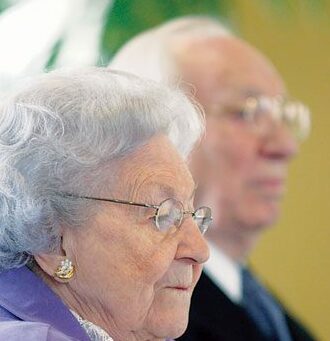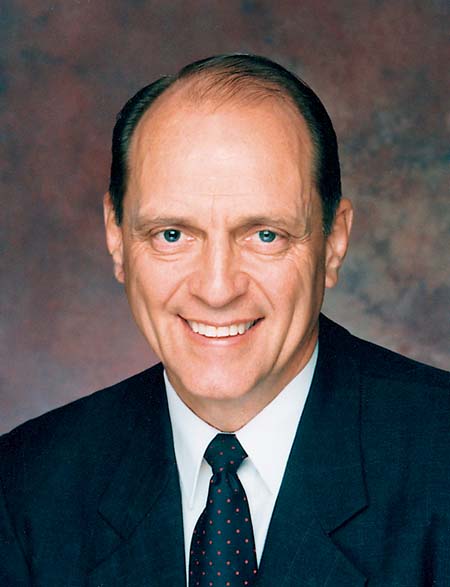Appropriate Zeal
Last spring— in the context of a number of opportunities, concerns, and issues we were facing here at BYU—I read, as I have many times over the years, of a Book of Mormon personality who has seemed largely a peripheral figure. I speak of the Nephite Zeniff. As I tried to “liken all scriptures” unto myself, as we are counseled by Nephi (1 Ne. 19:23), I perceived perhaps for the first time some interesting parallels or character traits that I also observe in our community and even in myself from time to time.
You will recall that Zeniff’s son, King Noah, and his grandson, King Limhi, were both more prominent in Book of Mormon history than was he. Zeniff lived roughly 400 years after Father Lehi and his people arrived in the promised land. Driven from their ancestral lands in the New World, the Nephites were primarily located in a place called Zarahemla. Zeniff had been a participant with a group of Nephites who were committed to taking back or reestablishing the Nephite nation in the land of Nephi. Not everyone shared his politics or his priorities, and, in fact, this issue led to considerable conflict and carnage among the Nephites themselves.
Now to the central point of this account. After describing the horrible contention and bloodshed these disagreements engendered, Zeniff said:
I being over-zealous to inherit the land of our fathers, collected as many as were desirous to go up to possess the land, and started again on our journey into the wilderness to go up to the land; but we were smitten with famine and sore afflictions; for we were slow to remember the Lord our God. [Mosiah 9:3; emphasis added]
To my knowledge, there is only one other place in the scriptures where the term overzealous is found. This is where Zeniff’s grandson, Limhi, is describing Zeniff (see Mosiah 7:21) and comments that because he was overzealous, he allowed himself to be deceived by wicked King Laman, which led to the captivity, suffering, and disadvantage of the group of people he led.
It is clear that Zeniff’s misplaced zeal led to poor decisions that not only affected him personally in adverse ways but also caused tremendous difficulties for others under his influence.
Can you see any potential dangers in being overzealous? I know that all of you can perceive this interesting trait in others, but does it ever creep into your own persona as well? I hope that is something we all try to consider at least a little, and correct if necessary, on a regular basis.
Now let me be clear. We are in favor of correctly focused zeal. We admire courageous leaders and those who are willing to sacrifice or stand for what they know is right. The scriptures are replete with references to zeal, and the word is often attached to deity. Without zeal and other associated virtues in courageous leaders and followers of previous days, we would not have this nation or this university, the gospel would not have been restored, and many other events of extreme importance would not have happened.
“If we are not careful, our zeal for good things can exceed proper boundaries, and we may miss the mark.”
Likewise, we abhor slothful behavior and thinking that are antithetical to righteous and appropriate zeal.
Thus we must be careful that we do not overdo or underdo any of the important things that deserve our attention. While there are many applications of these principles that we might profitably address, I will mention only a few that have fairly wide applicability in our campus community and beyond. You will be able to think of additional themes and examples, and I suggest you tailor a list that best meets your own concerns, potential weaknesses or strengths, and most important priorities.
I Shall Forebear
Because of the season we have just passed, I think of two areas in which examples of the extreme are quite prevalent. I speak of politics and sports. In the political arena, we recently completed an election year, and emotions flared with rampant expressions of strong opinions, advocacy, and criticism. I encourage you to become informed and to vote your educated conscience every Election Day. Participate in the process as your time and inclinations allow, but please be sure to be considerate of other opinions, people, and perspectives. Please also remember that The Church of Jesus Christ of Latter-day Saints and Brigham Young University are firm in our positions about protecting our institutional political neutrality.
Likewise, we have an almost continuous lineup of athletic contests during each school year. While most of our students and community members are exemplary in their sportsmanship, we as a group of avid boosters can do better and must do better in respecting our opponents and, frankly, ourselves by acting the way representatives of Brigham Young University should act.
We applaud your enthusiasm, and our student athletes recognize and appreciate your support. However, in both athletics and politics, we see far too many examples of overzealous behavior, and I invite you to help solve the problems and not be the creators or promoters of offensive and boorish behavior. It doesn’t matter what others do. Their poor judgments or actions do not justify imitation. They certainly do not justify acting or behaving in unseemly ways by those who have made the commitments that members of this community have made.
“We are in favor of correctly focused zeal. We admire courageous leaders and those who are willing to sacrifice or stand for what they know is right.”
In a similar vein, we occasionally witness among us those who give counsel or criticism when they themselves do not have all the facts or the responsibility to so comment. Inappropriate observations about the personal choices of others when differing from their own preferences unfortunately are not restricted to just politics and athletics. Uninvited input regarding intensely personal decisions like whom to marry or when to have children if married (as if every couple can cause these things to happen on their own timetable—they cannot!), opinions about proper and improper majors or career choices for women or men, and other intrusive verbal or behavioral assaults should never be heard or found in the BYU community. Happily, they are rare, but when they do happen, they are extremely hurtful. Above all, none should ever attempt to impose guilt or distress upon another by being overzealous in interpreting the directions and counsel of the living prophets. The Brethren are extremely careful and clear about what they say and mean, and we should follow their example.
I like the response of the prophet Alma when asked a question by his son. Note that Alma didn’t say, “I don’t have an opinion.” Rather, this was his response: “Now these mysteries are not yet fully made known unto me; therefore I shall forbear” (Alma 37:11). We all should forbear more often and more thoughtfully.
Zeal in Student Life
I also need to offer counsel to you students about keeping your zeal in proper boundaries with respect to matters such as your hobbies, your creativity, and even your studies. As you know, or are now finding out firsthand, BYU is a very no-nonsense place when it comes to scholarship and academic activities, even though we also know how to have appropriate fun. All of you are bright and able or you would not have been invited to enroll. All of you will need to study hard to succeed and will need to take your course work and other academic endeavors very seriously. But even here you can become overzealous and miss the mark if you are not careful.
There are those who believe some come to BYU just to socialize or to meet others with similar values and goals and hopefully to find an eventual eternal companion. While this is not the only reason for attending BYU or even perhaps your primary motivation in coming here, please do not wait until you have ordered your graduation cap and gown to do all you can to meet and get to know someone with whom you might wish to spend your life in creating a new eternal family. If finding a mate is your only concern, BYU is the wrong place for you. But if you leave BYU without doing all you can to fulfill this important obligation in Heavenly Father’s plan, you will have missed a great opportunity and may pay a very heavy price in the future.
Make no mistake, even with the best of intentions and efforts, some of you will likely not find that special someone while you are here. If that is the case and you have done your best, I promise you that heaven will help you and cause it to happen, even if it takes a very long time and extends beyond your mortal probation. Just be sure that you are doing what you can and should in all that you do here. Hanging out occasionally may be fine, but appropriate dating at the right time and in the right way is very important.
On a different topic but with the same theme, let me speak candidly with you about the tremendous opportunities you have before you at BYU to grow in the gospel as well as to mature in your academic specialty and general education. I regularly meet students who are so focused on gaining a specific credential, on getting admission to a particular professional school or graduate program, or on receiving well-earned distinction at the time of graduation that they fail to have the full experience of participating in their student wards and stakes and in the spiritually strengthening activities and events on campus, such as these devotionals. I can promise you that if you will plan your time, discipline your activities, and set your priorities properly, you will grow and develop in all spheres of your lives in ways that would not be possible elsewhere. You need to be intellectually stretched but also spiritually strengthened.
As I visit in various stakes on assignment around the world, I frequently meet Church leaders who are BYU alumni and who express gratitude for three things: First, that they had the opportunity to meet their eternal companion at BYU; second, that they learned important lessons in Church administration and leadership in their student wards; and third—often mentioned third—that they received a wonderful education that has prepared them well for the careers they are pursuing. Be zealous in all of the good things your BYU experience offers you but avoid being overzealous in any one dimension that will lead you to being restrictive, confused, and misled in your quest to achieve all that you might gain here at BYU. Being overzealous will cause you to miss opportunities to serve as well as limit your capacities for significant future service throughout your lives.
Be Diligent in Wisdom and Order
The Lord is aware of the tendency of the natural man and natural woman in all of us to be overzealous about some things and, as a result, to be slothful and neglectful about others. As I conclude, let me turn to the scriptures for some important counsel.
First, from the concluding instruction of King Benjamin in his great benedictory address: He had spoken directly and clearly to his people about their tremendous responsibilities in living the gospel as he had taught it. He saw that they were anxious to be not only good and obedient but to do everything their prophet-king and the Lord asked of them. Think carefully and invite the Spirit to teach you while you consider these words:
“Be careful in your priorities.”
And see that all these things are done in wisdom and order; for it is not requisite that a man [or a woman] should run faster than he has strength. And again, it is expedient that he should be diligent, that thereby he might win the prize; therefore, all things must be done in order. [Mosiah 4:27]
Second, from the counsel of the Lord to the Prophet Joseph Smith after Joseph had made a very serious mistake when he was close to the age of most of you: You recall that while in the process of translating the Book of Mormon, Joseph let Martin Harris temporarily take 116 pages of the manuscript that were subsequently lost. Because of this terrible error, Joseph lost his gift of translation for a season, and he was terribly depressed and disappointed in the situation. After a period of repentance, the gift to translate was restored to young Joseph, and he was admonished to finish the work that he had been given to do. It was at this time that the Lord gave this wonderful tutorial that I likewise share with you:
Do not run faster or labor more than you have strength and means provided to enable you to translate; but be diligent unto the end. [D&C 10:4]
My counsel to you, my dear young friends, is to be clear in your priorities, in your understanding, in your faith, and in all your endeavors. Don’t be like Zeniff, overzealous. Be like King Benjamin, who received his message from an angel, and Joseph Smith, who was taught directly by the Lord.
Do what you do with wisdom and order. Do not run faster or labor more than you have strength and means, but be diligent always.
Cecil O. Samuelson is the president of BYU. This essay is condensed from a devotional address given Sept. 7, 2010. The full text is available online at speeches.byu.edu.
Feedback: Send comments on this article to magazine@byu.edu




